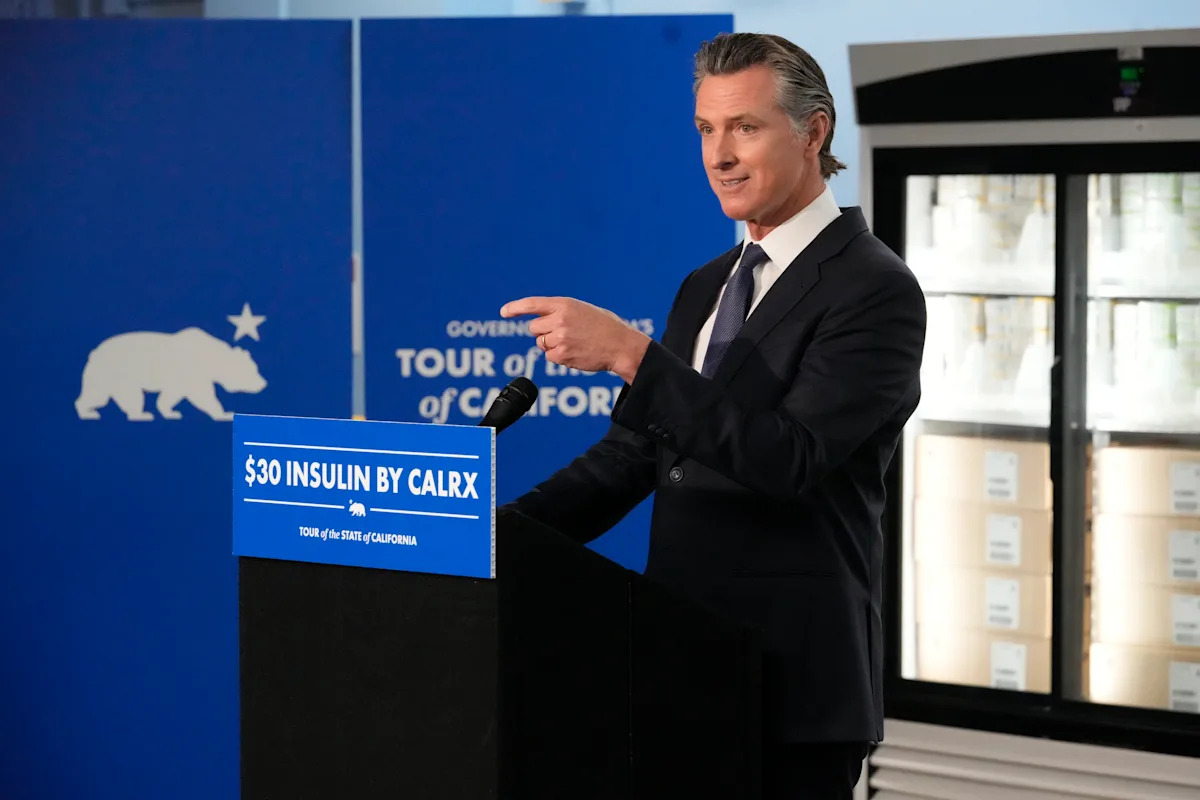SACRAMENTO, California — California will start selling low-cost insulin in January, becoming the first state in the nation to bypass Big Pharma with its own supply of the expensive diabetes drug and marking a notable win in Gov. Gavin Newsom’s push to rein in health care costs with state-branded drugs.
The insulin pens will be supplied through the CalRx program, an initiative launched under Newsom in which the state contracts with manufacturers to produce generic pharmaceuticals. The pens, which people with diabetes use to control the level of insulin in their bodies, will be the same as other long-acting insulin on the market. They will come with a suggested price for consumers of no more than $55 for a pack of five – a significant discount from current prices.
“California didn’t wait for the pharmaceutical industry to do the right thing — we took matters into our own hands,” Newsom said in a statement announcing the new drug. “No Californian should ever have to ration insulin or go into debt to stay alive — and I won’t stop until health care costs are crushed for everyone.”
The announcement establishes California as the vanguard among states searching for ways to keep health care affordable in a system dominated by for-profit companies and underscores the the Golden State’s ability to leverage the scale of its massive economy and buying power. And the insulin supply chain delivers a milestone for Newsom, who early on made CalRx a centerpiece of his administration but until now had little to show for it.
The end run around pharmaceutical behemoths burnishes the state’s go-it-alone ethos, which was perhaps best captured by former Gov. Jerry Brown proclaiming in 2018 that California would launch its “own damn satellite” to track climate altering emissions. Newsom has since made Brown’s moonshot a reality.
The cost of insulin has come down since it was a major political issue in 2017 when the top manufacturers of the drug – Eli Lilly, Sanofi and Novo Nordisk – were accused in a class action lawsuit of dramatically raising prices each year. A prescription that had cost patients $25 had ballooned to $300, the lawsuit claimed, and politicians latched on to the issue as an example of the pharmaceutical industry run amok. In 2024, the federal government brought a suit against pharmacy middlemen, also accusing them of contributing to the ballooning cost of insulin.
The hundred-year-old drug has long been a poster-child for what critics allege is price gouging by the pharmaceutical industry. Both President Donald Trump and President Joe Biden have claimed credit for capping insulin costs at $35 for Medicare plans.
Under the CalRx deal, pharmacies in California will be able to purchase the 5-pack of insulin pens for $45 and sell them to patients at the suggested retail price of $55. Similar products from name brand companies cost pharmacies between $89 and $411, according to state figures.
The announcement that the state’s insulin will be available at the start of the new year comes as something of a surprise after state officials said in February that CalRx could still be years away from bringing insulin to patients as it sought formal approval from the federal Food and Drug Administration.
After Newsom established CalRx through legislation in 2020, the program was first funded in 2022 and the following year the state struck a $50 million deal with the nonprofit firm Civica Rx to produce insulin.
Civica Rx built a manufacturing plant in Petersburg, Virginia and later contracted with another manufacturer, Biocon Biologics, to get long-acting insulin on the shelves for CalRx. They plan eventually to produce the three most widely used types of insulin: Glargine, Aspart, and Lispro. Glargine, a generic for Sanofi’s Lantus, will be the first to be available in January.
Through CalRx, the state has also contracted to provide a cheaper version of the naloxone, which can reverse an opioid overdose. And earlier this year Newsom announced plans to work on bulk-purchasing asthma medication. He has also floated the idea of using CalRx to either produce or stockpile abortion medication.

